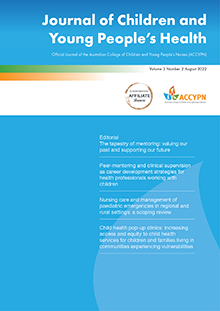Problem Paediatric nursing is a specialty that relies on a specific knowledge and skill set to care for children in hospital, particularly when presenting to the emergency department. Recognition, interpretation and understanding the unique needs of paediatric patients requires nurses to consistently rely on best practice approaches informed by research evidence. In rural healthcare settings, paediatric nurses may be disadvantaged in maintaining current, evidence-based practice aimed at achieving optimal health outcomes.
Aim This scoping review sought to explore and critique the published literature examining the rural emergency nurse (REN) care of paediatric patients presenting to emergency departments of three similar geographically sized countries of Australia, Canada, and the United States of America (USA). Two broad questions underpinned this aim: In rural emergency settings, 1. What are the professional development needs of RENs in emergency paediatric care? and 2. What are the facilitators and barriers in developing and updating paediatric nursing knowledge and skills in this context? It was anticipated that scoping review findings could inform new approaches to address identified needs.
Methods Arksey and O’Malley’s Framework for Scoping Reviews was used. The review systematically explored the extent and areas of focus in the nursing literature, with searches completed across eight databases. Searches focused on peer-reviewed research. Reference lists of retrieved articles were also searched, and citations were further explored to elicit additional research in paediatric emergency care in rural health settings. Searches focused on literature published from 2000 onwards, due to the limited results yielded in a ten-year retrospective review. Keyword search terms developed with the librarian were used with English language as the selected inclusion. After titles and abstracts, and full text reviews were completed, five studies were identified, for both synthesis and thematic analysis for the generation of themes. Due to the dearth of literature identified using these search terms, searches were extended to the grey literature in Google Scholar for any unpublished literature.
Findings There is limited research focused on paediatric nursing emergency care in rural health practice. Data extraction and analysis revealed the three key themes: (a) competence and confidence in paediatric emergency care, (b) barriers for evidence-based paediatric care, and (c) challenges for paediatric nursing education. Provision of educational opportunities and staff support is needed for Registered Nurses working in rural healthcare settings, specifically for paediatric emergency nursing practice. Education must be accessible and grounded in evidence-based practice for care of paediatric patients to ensure optimal patient outcomes. This contributes to REN knowledge, skills and confidence in caring for children and young people, who have a higher vulnerability due to their potential for rapid deterioration in condition, and who may have limited access to paediatric expertise due to location.
Conclusion Focused research into the experiences of rural emergency nurses in providing paediatric care is needed to identify challenges and investigate ways to enhance evidence-based paediatric nursing care. Educational opportunities that are accessible, affordable and appropriately resourced are imperative for quality and safe paediatric care and management in the rural context.



